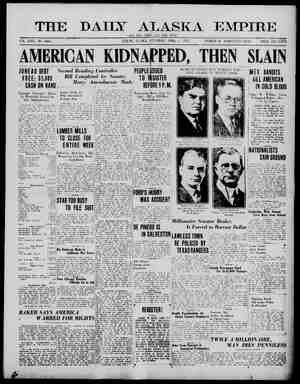The Daily Worker Newspaper, April 2, 1927, Page 5
You have reached the hourly page view limit. Unlock higher limit to our entire archive!
Subscribers enjoy higher page view limit, downloads, and exclusive features.
5 | Toe New MaGaAZINE - Section of THE DAILY WORKER Second Section: This Magazine Section Appears Every Saturday in The DAILY WORKER. SATURDAY, APRIL 2, 1927. ALEX BITTELMAN, Editor AS AN ARTIST SEES THE SPRING SPRING; ROBBIN Bes a tO, ING: TABLOID , COOD GOSH, BUT THAT THING STINKS! CHINESE REVOLUTION. EDITOR’S NOTES Hew rapid industrialization of the south is un- doubtedly one of the major developments in post- war American capitalism. This development is hav- ing far-reaching effects not only upon the south but upen the country as a whole. And yet the American labor movement has hardly begun to realize the meaning and significance of these developments for the working class of the United States. Not so with the American capitalists. They are fully awake to the possibilities of the situation from the point of view of strengthening capitalism and weakening the labor movement. And they are mak- ing ample use of these possibilities as is seen in the coal strike situation and in many more factors of importance. : Discussing the present coal mining situation the capitalist press is deriving a good deal of comfort from the fact that the unionized coal area has stead- ily contracted while the non-union area has expand- ed. The opening up of coal mines in the south and the intensive development of the industry there was bound to affect very seriously the condition of the mine workers’ union. But it is primarily the failure of the Lewis administration to concentrate on or- ganizing these new fields that is responsible for the fact that the shifting of coal mining to the south has worked altogether to the interests of the capital- ists and against the workers, Because it does not at all follow that coal mining in the south must re- main a non-union industry. That the coal barons are banking upon these new fields remaining non- union and are doing all in their power to resist unionization, is quite natural. But it is altogether ‘ unnatural, in fact, criminal when union leaders pursue the same line. And this is exactly what Lewis and his henchmen have been doing. Despite, however, the criminal negligence of the Lewis machine to organize the unorganized miners, sentiment for organization among the southern min- ers is very strong. So much so that the first earnest effort to organize them will inevitably produce splen- did results. And this is the time when such action is most urgently needed. All efforts of the union must be devoted towards that end. It is only by striking the southern coal mines along with the others that a national bituminous coal strike will become a reality. And it is only through a national bituminous strike that the miners will win. x * HAT conditions in the south are over-ripe for successful union organization can be seen also from the attitude of the southern church. When prominent dignitaries of the Episcopal and Metho- dist churches of the south feel compelled to appeal to the capitalists for “better” relations with labor and for industrial peace in order to “avoid the waste and bitterness of industrial conflict,” this is a sure sign of restlessness among the workers and of their becoming ready to assert themselves against the capitalists in an effective way. For it isn’t the mis- ery of the workers that is worrying the church dig- nitaries but the approach of struggle against this misery by the working masses themselves. + * * UCH an appeal to the “industrial leaders of the south” was signed by about forty bishops and IN WALL STREET By Hay Bales By ALEX BITTELMAN' ministers representing every section of the south. The appeal calls for “friendly” cooperation of em- ployers, employes; churches, educators and state officials “to improve social and economic conditions of southern industry.” The things to be improved, according to the appeal, are: the isolation of popu- lation in the mill village; the long working week, extending in many industries even to. fifty-five and sixty hours; a certain amount of the seven-day week, which still exists in some industries; the employment of women, and children between 14 and 16 at over- long periods of labor; low wage standards in some industries with consequent depressed standards of living and the general absence of labor represen- tation in the factories. + os * HESE are the damnable conditions in the south which even the church is forced to recognize and speak about because of the approaching “danger” of industrial conflict. But this means nothing to Lewis of the miners’ union, MacMahon of the textile work- ers and similar types in reactionary gangdom. To them these conditions are inventions of the Com- munists and progressive trade unionists which must be exterminated for the greater glory of the capital- ists and their flunkeys in the labor movement. But how about the facts? How about these mill villages in the south? . * * foc churchmen are not very explicit in their ap- peal. But even they are forced to admit that “life in a mill village under company control is not (Continued on Page Five)




